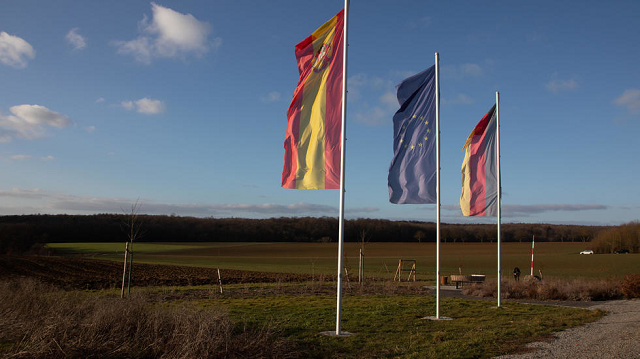Sadness and hopes for future at EU's post: Brexit centre
Farmer Karin Kessler says the few dozen inhabitants have very mixed feelings about the new distinction

PHOTO: AFP
Wrapped up in a woolly hat and scarf against the January cold lying over the bare fields, farmer Karin Kessler says the few dozen inhabitants have "very mixed feelings" about the new distinction.
When she heard in March 2017 that the EU's centre would shift to Gadheim, she believed it was a far-fetched April Fool's joke nine months after the British voted to quit.
Britain and US to conclude trade deal this year: Mnuchin
But the spot -- nine degrees, 54 minutes and seven seconds east and 49 degrees, 50 minutes and 37 seconds north -- was calculated precisely by France's IGN geographic institute using a "centre of gravity" model taking into account the bloc's remaining territory.
"My son found the coordinates and sent me a picture on WhatsApp," Kessler remembers.
"I zoomed in and said, oh, that's on our neighbour's field. And he replied, no, it's on our land!"
Since then, the municipality and the local landscape gardening school have pitched in to help shape the plot marking the new centre, even during the many months of suspense over when Brexit would come -- or whether it would at all.
"I definitely followed the debate in Britain, I was always getting the news on my phone. It was like a never-ending story," Kessler says.
"I sometimes thought, don't the British have anything else to do but Brexit? So many people were demonstrating to stay after all that the outcome seemed really open, we really didn't know whether it would be for or against the EU."
Britain's departure prompted fears for the future of the EU among local people, Kessler says.
Her father, who passed away in 2019, had been a soldier in World War II and saw the bloc as a guarantor of peace and stability on the continent in the post-war decades.
"I think there's plenty of people, especially those still with us who experienced the war, who can identify with that."
Now a boulder of local limestone marks the post-Brexit centre, with a tilted red-and-white striped pole pointing to the previous location, some 60 kilometres (40 miles) to the northwest in Westerngrund.
Brigitte Heim, mayor of the municipality there, has had an equally "nerve-racking" time watching the back-and forth in Britain.
But at least "now each country can look to the future for itself, and maybe that will bring people back together a little in England," she hopes.
People in Westerngrund always saw the centre of the EU as a "gift for a limited time," Heim says.
"We see it as part of our history, our story," although perhaps if the Scots manage to break free, the centre could come back," she jokes.
Even in Gadheim, "part of us hoped Brexit wouldn't happen, so we could keep Europe the way we've known it," says Juergen Goetz.
The mayor of nearby Veitshoechheim -- Gadheim is too small to have a mayor to itself -- Goetz adds that locals are "happy" to be named centre of the EU, talking up the area's ties to the rest of Europe.
Veitshoechheim has partner cities in Italy, France and the Czech Republic.
A blog about its links with Pont L'Eveque proudly displays pictures of visitors from the Norman town enjoying recitals from the children's choir and a visit to a local vineyard in 2017.
And in a major gas pipeline and a section of the centuries-old pilgrimage routes to Santiago de Compostela in Spain, infrastructure both ancient and modern links Veitshoechheim to neighbouring countries.
Looking ahead, "you can't know what effects Brexit will have for Britain and for the rest of Europe," Goetz muses.
"It'll depend on whether Britain manages to profit so much economically from leaving that there could be imitators. Of course, I hope no-one else leaves."
Post-Brexit: Pak-UK ties can advance to new level: envoy
One thing is certain for the Gadheimers: for all their meticulous preparations, the village-like other spots that have previously marked the EU's centre -- won't be the centre of the world forever.
"So far only new countries had joined, there's something historic about the centre of the EU moving because a country is leaving," Goetz says.
"I hope the next time it moves, it happens because a new country has joined us again."



















COMMENTS
Comments are moderated and generally will be posted if they are on-topic and not abusive.
For more information, please see our Comments FAQ